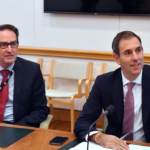The World Cup for Brazilians in Melbourne
The World Cup in Brazil is well under way, with the Brazilian team making it through to quarter-finals. Denise Frizzo shares how she and her fellow Brazilians are following the excitement from Melbourne.
As the World Cup in Brazil was about to start two weeks ago, the Brazilian community in Melbourne was already organising groups to watch matches together. Not an easy task, as we have to wake up in the middle of the night or very early in the morning to deal with the thirteen hours ahead of Australia time in relation to Brazil. Unlike in Brazil, where students and many workers are allowed to go home when Brazil is playing – and, this time, when there are matches in their cities – most of us in Melbourne have no excuse to not show up at work after a match. After all, one month of dark rings under our eyes every four years is not a big issue at all.
As the Brazilian community in Melbourne is spread over many suburbs, social media is playing an important role in getting people together for the matches. Through Facebook many people invite friends to watch the World Cup in their homes or in one of Brazilian restaurants which are offering breakfast and big screens. Social media is also a board for comments during and after matches. The first match, Brazil 3X1 Croatia, was remarkable mainly for two reasons.
Brazilian player Marcelo scored the first own goal in the history of the World Cup, leaving it just a few seconds before start appearing his photo on Facebook with jokes such as “well, at least I scored the first goal of the World Cup in Brazil” or “was it the wrong side?”. Then, when the Japanese referee made a mistake by giving a penalty to Brazil that did not exist when the game was 1X1, Brazilian fans exalted with ironic suggestions that Brazil has already bought the World Cup. At this point, the Brazilian president and FIFA were the targets, both commonly related to corruption. However, this time it was just a joke.
The excitement around the World Cup in Brazil is extended to the Socceroos by Brazilian fans. Not only because we are living in Australia but also because there is an inexplicable energy that makes us feel that the Australian team is our cousin who needs care and cheer. Many Brazilians are actually waking up at night to watch the Socceroos and give them support, even though the World Cup is already over for them. News from Brazil also reinforce this idea of empathy with Australians by relating the happiness of easy going people wearing green and yellow on the street with kangaroos hanging around their necks. In my hometown, Porto Alegre, where Australia played against the Netherlands, Australian fans were described as friendly guys who like learning local culture and enjoy a similar tradition to South Brazil: barbecue and beer.
The World Cup 2014 seems to bring mixed feelings to Brazilians. On the one hand, after decades Brazil is hosting an event with the magnitude of a World Cup, which exalts the national passion for soccer and opens the doors for different cultures in the country. On the other hand, there are all the social problems that concern the population and that have been internally aggravated by the World Cup in terms of priorities in money spending and social injustices.
If I could make a statement at this stage, in the middle of the World Cup in Brazil, I would say that Brazilians are well separating things by enjoying the genuine soccer and not blaming the Brazilian team for social issues; nevertheless social movements are kept active during the event, letting the nation and foreigners know that the government is in charge and nothing has changed since the series of protests that claimed “there will be no World Cup”. The World Cup is happening but, at the end of the day, the message has successfully been spread to the entire globe.
Denise Frizzo is a PhD candidate at Swinburne University of Technology and a Journalist volunteer at Brazilian Association in Melbourne – Abrisa. She is Brazilian and has been living in Melbourne since 2012. Her interests include migration, politics, language, culture and travel.












